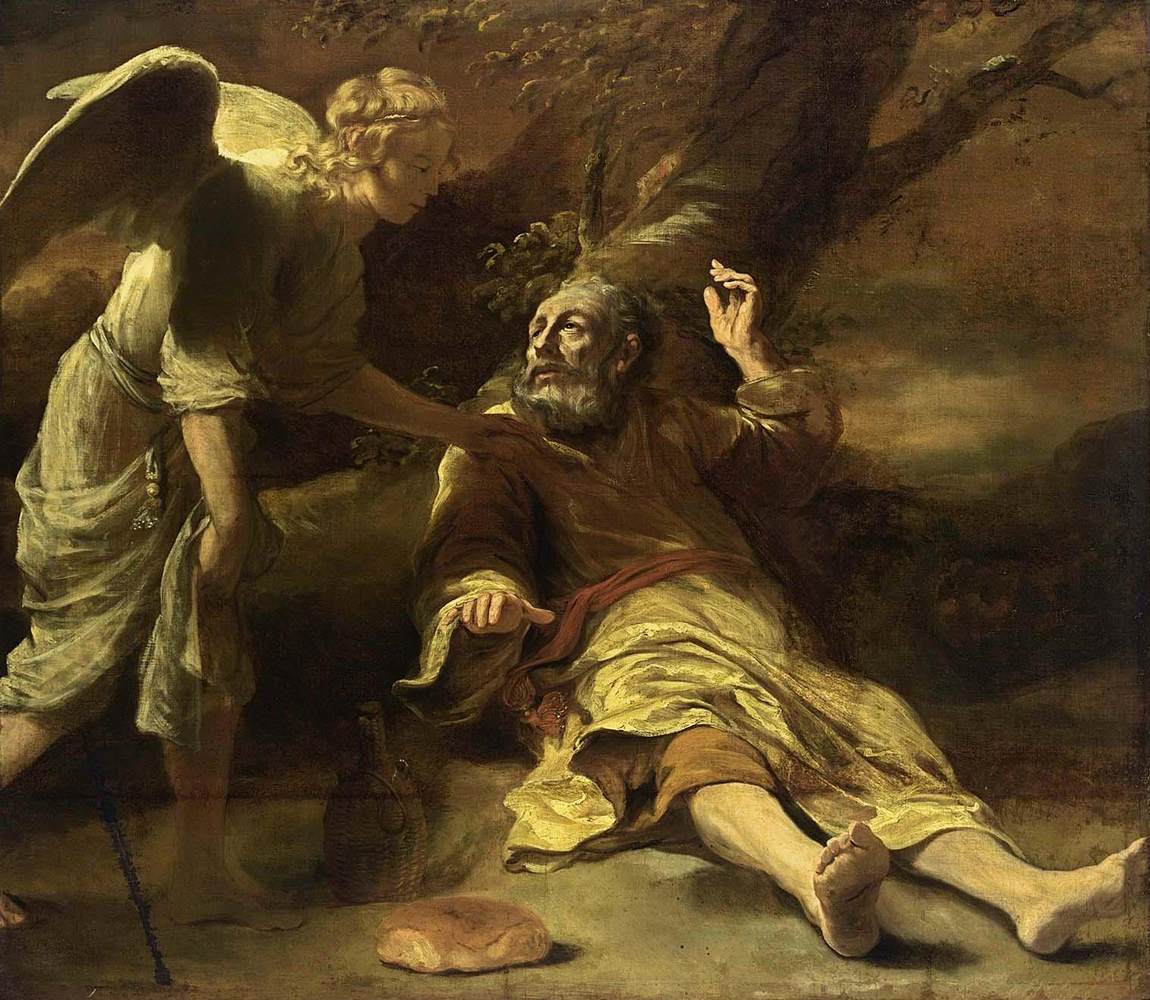 |
| El Greco, St. Dominic in Prayer |
May Saint Dominic come to the help of your Church by his merits and teaching, O Lord, and may he, who was an outstanding preacher of your truth, be a devoted intercessor on our behalf. Through our Lord Jesus Christ, your Son, who lives and reigns with you in the unity of the Holy Spirit, one God, for ever and ever.
* * * * * *
Nineteenth Sunday of Ordinary Time (Year “B”) - August 12, 2012
 |
| Ferdinand Bol (1616-1680), Elijah Fed by an Angel (1660-63) |
“TASTE AND SEE THE GOODNESS OF THE LORD”
[1 Kings 19.4-8 [Psalm 34]; Ephesians 4.30-5:2; John 6.41-51]
Psalm 34, which is the refrain for three Sundays in succession, tells of God's life-giving activity and urges people to experience it for themselves (“taste and see the goodness of the Lord”).
Readers are invited to identify with the trials of the psalmist (“this poor soul ... was saved from every trial”) and of Elijah. They are also asked to trust in God's saving design which came to a climax in Jesus' self-offering (‘the bread that I will give is my flesh for the life of the world”).
The wisdom of the psalmist contradicts the values of today's consumerist culture that assails believers at every turn. Advertising and other media of culture emphasize the value of possessions and status. Scripture, by contrast, stresses that dwelling in a trusting relationship with God brings joy and fulfilment in all circumstances.
God refreshes the spiritually crushed but, for all that, does not quash the forces that create injustice. God's care mends broken hearts yet paradoxically does not prevent them from being broken.
Take the case of Elijah, for example. The prophet was in utter desolation as he despaired of his vocation to save Israel from the idolatry imposed by Jezebel who sought his life. Elijah complained that God was asking superhuman things of him: to convert the king and the whole people all by himself.
Elijah prayed that God take his life (“Enough! Now, O LORD, take away my life). If God were to accept Elijah's petition, he would then be free of God's call. If Elijah's petition is refused, however, God would need to address the underlying issue and intervene more powerfully in a way that would help Elijah bring Israel back to its senses.
A messenger had brought Elijah's death threat (1 Kings 19.2). Now a second messenger (“an angel”) startled Elijah out of his sleep, offering life instead of death (“Get up and eat”). This was repeated a second time so that Elijah was able to travel “in the strength of that food forty days and forty nights to Horeb the mountain of God”.
In other words, God did not relieve Elijah of his vocation to serve Israel. Rather God led him to uncover further mysteries along his journey. At every turn, Elijah would make further discoveries of the ways in which God chooses to keep on being implicated in the world.
In hs discourse on the ‘Bread of Life’ Jesus continued revealing facets of himself and his Father. The crowd claimed to know Jesus human parentage (“Is not this Jesus, the son of Joseph, whose father and mother we know?”).
While the Fourth Gospel makes no reference to Jesus' infancy, these words may be an ironic allusion to traditions about his birth. For the believer, however, Jesus is God's Son and his earthly family gives no clue to his true identity.
This discourse contains the greatest number of allusions to Jesus' “descent” (6.33, 38, 41-42, 50-51, 58). They solidify the link between the manna miracle and Jesus' revelation of himself as the “bread of life”.
Because the grumbling of the crowd manifests disbelief, Jesus responded by showing that it is God's initiative that makes faith possible (“No one can come to me unless drawn by the Father who sent me”).
Also, Jesus cited Scripture—probably a paraphrase of the Old Testament Greek version of Isaiah 54.3—to underline the universality of the Father's saving intention (“It is written in the prophets, ‘and they shall all be taught by God’”). Everyone who hears the voice of the Spirit teaching innerly, Jesus concluded, “comes to me”.
According to Ephesians, heeding the Spirit at work in one's life is not an once-and-for-all happening, but an ongoing challenge (“Do not grieve the Holy Spirit with which you were marked with a seal for the day of redemption”).
Christian discipleship has a two-fold dimension. Putting aside ways of life incompatible with following Jesus (“bitterness and wrath and anger and wrangling and slander, together with malice”) and embracing those in keeping with it (“be kind to one another, tenderhearted, forgiving one another, as God in Christ has forgiven you”).
The shorthand summary of these is: “Be imitators of God ... and live in love, as Christ loved us and gave himself up for us”.
No comments:
Post a Comment